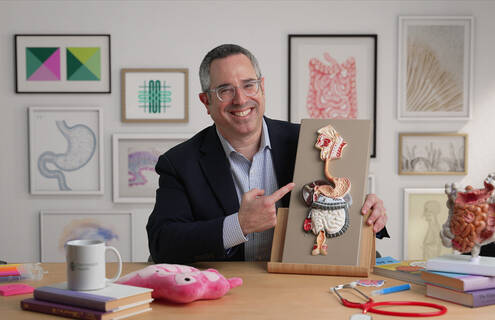
Do you have Crohn's or ulcerative colitis?
Consult with a gastroenterologist who typically specializes in inflammatory bowel diseases (IBD). That's because left untreated, these diseases can not only worsen, but also become much harder to treat.
"Damage can build, so eventually, medications will not work," says Corey A. Siegel, MD, MS, director of The Walter and Carole Young Center for Digestive Health,
One UK study showed that providing access to early treatment for Crohn’s disease immediately after diagnosis was five times more effective in helping patients control inflammation and reduced the need for urgent abdominal surgery by 10 times. Other studies suggest that early treatment is also associated with improved clinical outcomes in both adult and children populations.
If you do have signs and symptoms of Crohn's or ulcerative colitis, Siegel provides answers to common questions from patients about diagnosing and treating these diseases.
How do doctors determine if you have Crohn's disease and ulcerative colitis?
Doctors conduct a colonoscopy. This procedure means putting a colonoscope through the anus, into the rectum, and around the entire colon to look into the small intestine. You will need to prepare for the procedure by cleaning out your colon and your intestines with a prescribed laxative so the doctor gets a clear view.
Are they autoimmune diseases?
Crohn's disease and ulcerative colitis are not autoimmune diseases. In other words, the immune system does not attack the body's own cells. Instead, these diseases are immune-mediated, meaning foreign pathogens or an imbalance in the gut microbiome likely trigger an immune response that attacks bacteria rather than the organ itself.
Are Crohn's disease and ulcerative colitis fatal?
No. With proper treatment, these diseases can be largely controlled over time. While in some very unusual cases, these diseases can get out of control, the inflammation is usually managed with treatment.
What if you don't get treatment?
Crohn's disease and ulcerative colitis are both progressive diseases. That means if they are not treated effectively early, the damage can build, so eventually, medications will not work. A small number of people might be okay not using medications regularly, but medication is important if you wish to effectively control the inflammation and prevent damage.
What medicines are used and should I worry about the side effects?
This question comes up often, says Siegel, especially given the number of ads about Crohn's disease and ulcerative colitis on television and the internet. But many safe options exist and any possible side effects are understood. Your doctor should know what to watch out for and be able to determine which medication is right for you.
Are there natural ways to treat them?
Yes, and one of the natural ways to treat Crohn’s or ulcerative colitis is diet. Two others are getting enough sleep and exercise. Many people also take supplements in addition to treatment. But the key to these approaches is that they are viewed as complementary. Many natural treatments may make you feel better, but on their own, they're typically not enough to heal the inflammation in the bowel.
What foods should you avoid?
With Crohn’s disease or ulcerative disease, foods do not make the inflammation worse or cause more damage, but some can be harder to stomach. In fact, when you're feeling well, you can probably eat what you want, but when you're not, certain foods will make you feel worse, even if they do not do long-lasting damage. That’s why it is important to work with a dietician to determine what foods to avoid.